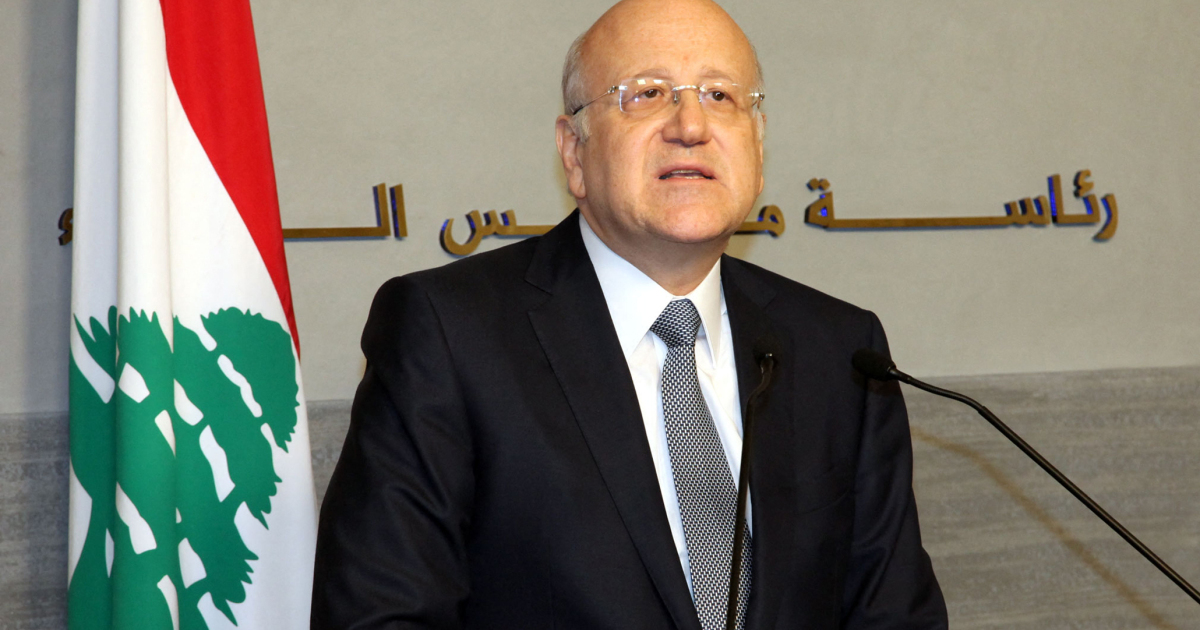
Former premier and billionaire businessman Mikati looks set to receive the majority of the votes.
Beirut, Lebanon – President Michel Aoun has started consultations with the parliamentary bloc with the aim of finding a new prime minister-designate.
Talks began at 10:30am (07:30 GMT) on Monday at the Baabda Palace and will continue until late afternoon.
Former premier and billionaire businessman Najib Mikati, who heads a three-member parliamentary bloc for the Azm Movement, looks set to receive the majority of votes.
Aoun has already met Mikati and former prime minister Saad Hariri, who endorsed Mikati on Sunday saying that the country urgently “needs a government”.
The candidate with the most votes will be appointed the new prime minister-designate and tasked with forming a government.
Along with Hariri and other former prime ministers Fouad Siniora, and Tammam Salam, Mikati has been backed by top Sunni political leaders.
In a statement on Sunday, Siniora said the endorsement is on the basis that he would form a technocratic government that would enact economic and structural reforms, and reopen bailout talks with the International Monetary Fund.
Speaker Nabih Berri and the Amal Movement also backed Mikati, and fellow Shia party Hezbollah is likely to follow suit after Mikati met with the political coordinator for party leader Sayyed Hassan Nasrallah.
Political analyst Bachar El Halabi says that Hezbollah’s endorsement of Mikati could help with any possible government formation negotiations deadlock with President Aoun and Free Patriotic Movement leader MP Gebran Bassil.
“But I’m not 100 percent sure if Mikati will form a government,” El Halabi told Al Jazeera. “we aren’t sure how long Aoun and Bassil will go on with their game of Russian roulette.” He fears they could try to stonewall government formation by setting strict conditions on ministry distribution with little to no compromise.
Even if Mikati successfully forms a government, El Halabi does not expect it to take the lead on enacting structural and economic reforms and pull Lebanon out of the mire.
“I think it will make sure general elections are held on time with the support of the international community,” he explained. “I don’t think it will play a foundational role with the economic crisis, but try to cushion the disaster that the Lebanese are living through – like secure fuel and try to control the fluctuating currency rate.”
Marwan Issa, 24 says there’s “definitely no trust” that Mikati government could implement life-saving reforms for crisis-hit Lebanon.
“The prospects of a Mikati government aren’t comforting,” Issa told Al Jazeera, expecting at most a “temporary calm.”
“He’s had a central position in decision making in the country throughout the last several years, and I think he’s one of the main actors in the ruling class.”
Mikati has also received endorsement from the Druze-majority Progressive Socialist Party.
However, the Tripoli businessman lacks support from the majority of Christian parliamentarians. The Lebanese Forces’ 15 MPs announced that they would not name a candidate, while the Free Patriotic Movement’s 31 MPs have reportedly opposed Mikati as an option, seeing him as too close to Hariri.
In Lebanon’s political system, the post of prime minister is held by a Sunni Muslim, the presidency is held by a Maronite Christian, and the speaker of parliament is a Shia Muslim.
The country has been without a full-fledged government for almost a year since caretaker Prime Minister Hassan Diab resigned following the Beirut Port explosion last August.
Lebanon continues to struggle with a crippling financial crisis that has pushed half its population into poverty and devalued the Lebanese pound by more than 90 percent.
The international community has repeatedly called on Lebanon to form a government committed to enacting structural reforms in order to unlock development loans and aid to restructure and recover its economy.
In October 2020, Hariri returned as prime minister-designate but was unable to agree with President Aoun about the size and sectarian distribution of a reformist and technocratic government. He resigned 10 days ago as a result of the nine-month political deadlock.
Mikati previously held two terms as Lebanon’s prime minister; first in a caretaker government for three months in 2005, then in a full-fledged government from April 2011 until February 2014.
He was also minister of public works and transportation in 1998. He heads the Azm Movement party and is one of its three MPs currently in Parliament.
In late 2019, Lebanese prosecutor Ghada Aoun brought charges against Mikati, his brother Taha and son Maher, and Bank Audi for illicit profiteering via subsidised housing loans. The Mikatis argued that the charges were politically motivated.







